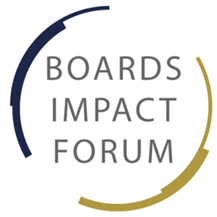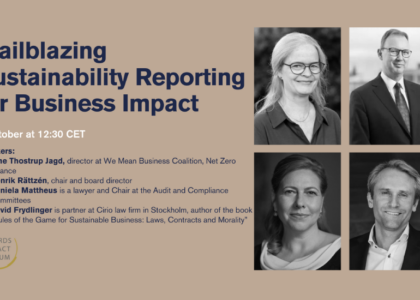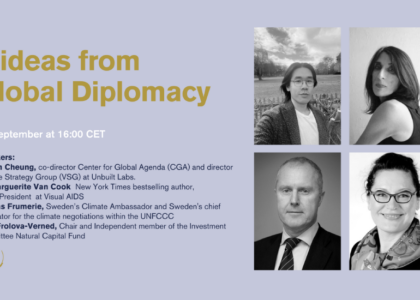Author: Lise Kingo, NED and Member of Boards Impact Forums Strategic Advisory Board
If climate hasn’t been placed center piece on the Board agenda yet, now is the time to make sure that it does. Lise Kingo, Fortune 500 NED and former of Executive Director of the UN Global Compact provides a set of recommendations to fellow Non-Executive Directors for how to advance the Climate Agenda in 2022 as their duty of care.
COP26 came and went: Some progress, many disappointments, few surprises. This has been much covered and discussed already, but despite the lack of ambitions and absence of key players the commitment from progressive businesses and governments has the potential to unleash an unprecedented wave of investments in the global energy transition.
Any business that plans to be in business 5-10-20-30 years from now needs to tackle this literally burning platform with a completely different sense of urgency. For Non-Executive Directors, this means taking personal leadership and responsibility to support chief executives and their organizations in accelerating their net-zero transformation.
Table of Contents
Science speaks volumes of the level of ambition required
The latest Climate Action Tracker, published at COP26, gives us a pretty good idea of what we are heading towards: With current policies we’re shooting for a 2.7°C degrees increase in global temperatures by 2050. By delivering on the 2030 targets, this will fall to 2.4°C degrees, and by fully implementing all submitted and binding targets we’re heading for a 2.1°C scenario. In the right direction, yes. Yet, we’re still heading for disaster.
According to UN’s Intergovernmental Panel on Climate Change, IPCC, we need to keep global warming well below 1.5°C. This half degree will make the difference from bad to catastrophic for billions of people, impacting lives and livelihoods. The past couple of years have already given us a flavor of what is in store: Extreme heat waves, floods, artic winters, droughts, wildfires and irreversible changes in the world’s ecosystems – it’s already happening. It’s no surprise that half of all CEOs (49%) state that supply chain interruptions due to climate change are among their top risks, according to a recent UN Global Compact-Accenture Strategy CEO report: Climate Leadership in the Eleventh Hour.
The Headline Board Agenda 2022 is Climate Action
According to the Climate Action Tracker, the ‘glass half-full’ version of the story is that if everyone deliver on their announced targets, we could deliver on a 1.8°C scenario. That’s why the headline Board agenda for 2022 should be ‘how to accelerate from commitments to transformational action’.
Also here the UNGC-Accenture report gives food for thought: Because while more and more CEOs are committed to taking climate action, they are struggling to accelerate their climate ambitions. 71% of CEOs say that they are actively working to develop a net-zero emissions target for their company, and 57% believe that they are operating in line with the 1.5°C goal. Yet as an indicator, only 2% of these companies have a formal target validated by the Science-Based Targets Initiative (SBTI). In contrast, companies working against science-based targets demonstrate real progress: From 2015-2019, SBTI companies collectively reduced their annual CO2 emissions by 25%.
Scope 3 Requires New Stakeholder Engagement Skills
Scope 1 and 2 that focus on the company’s own operations and the energy supply are not simple, but CEOs find it particularly hard to deliver in scope 3 of their emission targets. To broaden their net-zero impact throughout their supply chains, they need to work within their eco-systems of change, looking at competitors, policy makers, investors, providers and suppliers as stakeholders and partners. They need to join forces to improve traceability of their collective carbon footprint and agree on new incentive structures and price points to reward their collective progress towards net-zero.
This is a hugely complex agenda. It bridges planetary, social and economic dimensions. It requires that we rethink leadership, governance and strategy so we create stakeholder value by default. It takes new capabilities and skillsets at the leadership level. At the Board level, it starts by asking the right questions and by demonstrating the right level of support of senior management to steer the transformation through. But there is no other way.
Questions to take to the Board in 2022
As you prepare for 2022, how about bringing along the following 3 questions for your next Board meeting:
- Is ESG fully integrated in our overall business strategy and cascaded across the organization into transparent integrated reporting?
- Do we have a financed and operational Net Zero climate strategy aligned with the Paris Agreement and 1.5°C. for scope 1, 2 and 3?
- Are we ready for the new company reporting requirements, in the EU complying with the Task Force on Climate-Related Financial Disclosures (TDCF)?
The Board has an important role in encouraging management to launch into the Race to Zero: This is a radical and transformational innovation agenda that needs full support and attention from the Board.
This Article is also published at Greenbiz.

Boards Impact Forum, the Nordic Chapter of Climate Governance Initiative in collaboration with World Economic Forum, aims to enable better corporate climate and sustainability governance by inspiring, educating, connecting, and engaging board members in Nordic countries and internationally. We share insights together with our partners via webinars, peer exchanges, events, research, and information sharing, and collaborates with the other country and regional chapters of the Climate Governance Initiative.
We welcome all responsible board members to become members at Boards Impact Forum, and we invite Partners to support our important initiative, learn more here .
Join our next webinar on January 13 2022 on the topic of “Environment, Social and Governance requirements and Impact on Boards” with some top-level board members and academics as Chairs and NEDs Harri-Pekka Kaukkonen and Svante Forsberg and advisors Jane Jagd, We Mean Business, and Chrisitine Ehrnström, FCG. Read more and sign up here
Follow our upcoming events here, and revisit some earlier events here
The importance of managing the sustainability agenda and the climate issue by boards is increasing. Boards Impact Forum, the Nordic chapter of the Word Economic Forum’s Climate Governance Initiative (CGI), has been established to provide more insights. The Boards Impact Forum purpose is to engage board members in the Nordic region and internationally, to accelerate climate action and innovation for more sustainable business and a sustainable world. More information about Boards Impact Forum can be found here: https://boardsimpactforum.com/








Recent Comments